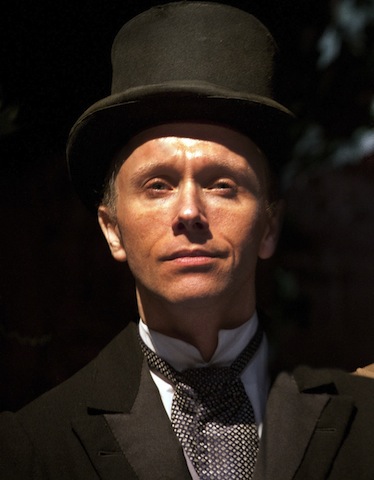Lizzie Siddal, Pre-Raphaelite muse and model for John Everett Millais’ 1852 sensation Ophelia, died a tragic death aged 32 from a laudanum overdose, the Victorian’s opiate of choice to which she had become addicted in her final years. Jeremy Green’s new play explores her relationship with Gabriel Dante Rossetti, who, with Millais and William Holman Hunt, formed the original PRB triumvirate. Artist and model eventually married, but only after the heat of Rossetti’s ardour had considerably cooled, leaving her devastated by his emotional rejection and thwarting her own ambitions to become an artist (the play doesn’t suggest that lack of natural talent might also have played its part).
It is Tom Bateman’s Rossetti who is by far the most fully fleshed character
But Green’s tale of art, idealism and romantic disillusion and disappointment is in fact peppered with laughs. It’s high on banter and broad on humour, occasionally just a little too broad. Hunt’s model and lover, and sometime prostitute, Annie Miller, is played with so much gurning and cockney cor-blimeying by Jayne Wisener that you wonder if you’ve stepped into a production of My Fair Lady. She certainly appears out of step with the rest of the cast and play, where laughs, in the first half at least, come naturally and easily.
In what is otherwise a very strong cast, Daniel Crossley, as a fastidious and slightly creepy John Ruskin (pictured below), critic and champion of the PRBs and later Siddal’s benefactor and patron (but looking suspiciously like a funeral director), manages to stand out with spot-on comic timing, while his supercilious air is punctured by his own social ineptitude. He also doubles as Rossetti’s even creepier literary agent Charles Howell, who persuades the grieving Rossetti to recover his handwritten poems from Lizzie’s grave seven years after her untimely death, since those are his only copy.
 If Green’s characterisation seems a tad unfair on the already historically rather maligned Ruskin (after all, here is a man noted for his belief in the education of the working masses and who profoundly influenced the founding of the Working Men’s College), then Hunt is not spared at all in Simon Darwen’s priggishly unsympathetic portrayal. Like Crossley’s Ruskin, Hunt is here seen to lack a high degree of self-awareness and harbours an even greater misogynistic streak.
If Green’s characterisation seems a tad unfair on the already historically rather maligned Ruskin (after all, here is a man noted for his belief in the education of the working masses and who profoundly influenced the founding of the Working Men’s College), then Hunt is not spared at all in Simon Darwen’s priggishly unsympathetic portrayal. Like Crossley’s Ruskin, Hunt is here seen to lack a high degree of self-awareness and harbours an even greater misogynistic streak.
Physically, Emma West makes for a remarkably convincing Lizzie Siddal (main picture), so it’s unsurprising to learn that the play was written with West in mind. In reality, beyond the merest sketch, we know little about her, so Green’s fiercely articulate, Tennyson-quoting Siddal might for some be taking poetic license too far for a woman who had no formal education and who was “discovered” working in a milliner’s shop. The proto-feminist reading of her life is hinted at, but there is only one unconvincing section when anachronistically yielding to contemporary values hits a somewhat false note. This is a scene in which the head of the art college she briefly attends in Sheffield (the part allowing a tripling of roles for Crossley) makes a speech about the paucity of women artists and Siddal’s uniqueness.
The play stretches over a decade, covering episodic chunks. More than Siddal, it is Tom Bateman’s Rossetti who is by far the most fully fleshed character: idealistic and sensitive in the first half and casually cruel in the second, and riven by guilt at what Siddal later becomes. Unable to love her, he thereby recklessly contributes to her disintegration. His romantic idealism – in love with love – is merely the flipside to his casual disregard. Meanwhile, James Northcote’s Millais, who unabashedly declares himself “the best painter in England”, remains the same charming and uncomplicated figure as he is at the beginning. His affair and later marriage to Ruskin’s wife is mentioned only in passing, and no mention is made of Millais being forced to pay Siddal’s medical bills when she becomes gravely sick with pneumonia, having posed in a freezing bath so that he could paint his magnum opus.
Director Lotte Wakeham manages, more or less seamlessly, to shift tone and give equal weight to the drama and tragedy of Siddal’s life in what could be a tonally uneven play, while David Woodhead’s set, with its lush climbing-ivy backdrop, beautifully but simply evokes the Pre-Raphaelite look.















Add comment